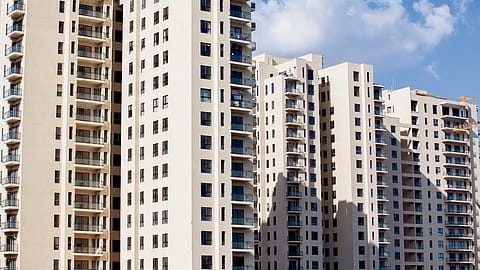Real estate players see short-term adverse impact from RBI rate hike
ANAROCK chairman Anuj Puri says though 25 bps rate hike is along expected lines, repo rate at 6.5% could have some repercussions on housing uptake as home loan interest rates will head further north.

The real estate sector stakeholders think the 25 basis points hike in the repo rate by the Reserve Bank of India (RBI) will have an adverse impact on the affordable housing segment. However, if the RBI measure results in more stability in the economy, that can in turn increase consumer confidence and demand for the sector in the medium term, sector experts say.
“The outrageous hike of 250 basis points since May 2021 needs to be warranted before it turns negative for the ascending Indian economic growth curve. The impact of the home loan interest rates hike will be highly deterrent in the affordable housing segment as it will impact the price-sensitive homebuyers and fatigue the supply of the developers. The luxury and mid-housing segment players will remain cautious with a bit longer sales cycle,” Niranjan Hiranandani, managing director of Hiranandani Group and National Vice-Chairman, NAREDCO said.
Anuj Puri, chairman of property consultancy ANAROCK Group says though the 25 bps rate hike is along the expected lines, the repo rate at 6.5% could have some repercussions on housing uptake as home loan interest rates will head further north.
“The rates had already crept up after five consecutive hikes over the past year. This will add to the financial burden on homebuyers as apart from home loan interest rates, property prices have also inched up in the past two to three quarters. Given that interest rates may breach the 9.5% mark with today’s hike, we may see some pressure on sales volumes in the affordable and lower mid-range housing segments, which are more cost-conscious. The affordable segment has already been in the doldrums, and adding further to the cost of acquisition obviously does not help,” he said.
Experts, however, felt that given the resilience of the Indian economy and the thrust given by the government for infrastructure development in the Union Budget 2023-24, the effect could be short-term.
“The Indian housing market continues to be largely end-user driven -- and end-users, unlike investors, focus less on ROI and more on the perceived value of homeownership. Furthermore, commodity prices are now falling and inflation is moderating. As such, we are unlikely to see any hikes in the near future, which will be positive for the housing sector in times to come,” Puri says.
According to Hiranandani, the geo-political tumultuous, recession signals, and weakening of western economies will reorient the growth scale towards the booming economy of India. This phenomenon will continue to draw high global traction which will fuel the demand across the real estate asset classes.
Recommended Stories
Ramani Sastri, Chairman & MD of Sterling Developers saw the huge outlay on infrastructure and higher public expenditure outlined in Budget 2023-24 to be a silver lining. “Additionally, the buying power of consumers has gone up with greater income flow in recent times. We believe that the demand for the residential segment would remain robust in the near future, any hike in interest rates notwithstanding. Also, the strong fundamentals for housing demand will keep the momentum upwards for realty sales,” Sastri says.
Anshuman Magazine, Chairman & CEO - India, South-East Asia, Middle East & Africa, CBRE, said the RBI’s decision to hike the repo rate by 25 basis points may be "one of the last" in the ongoing rate hike cycle as inflation has moved toward a comfortable zone. "We do not expect any sweeping impact on the real estate sector or housing sales for now, given the demand has remained upbeat and the recent budget announcements will spur the growth momentum."